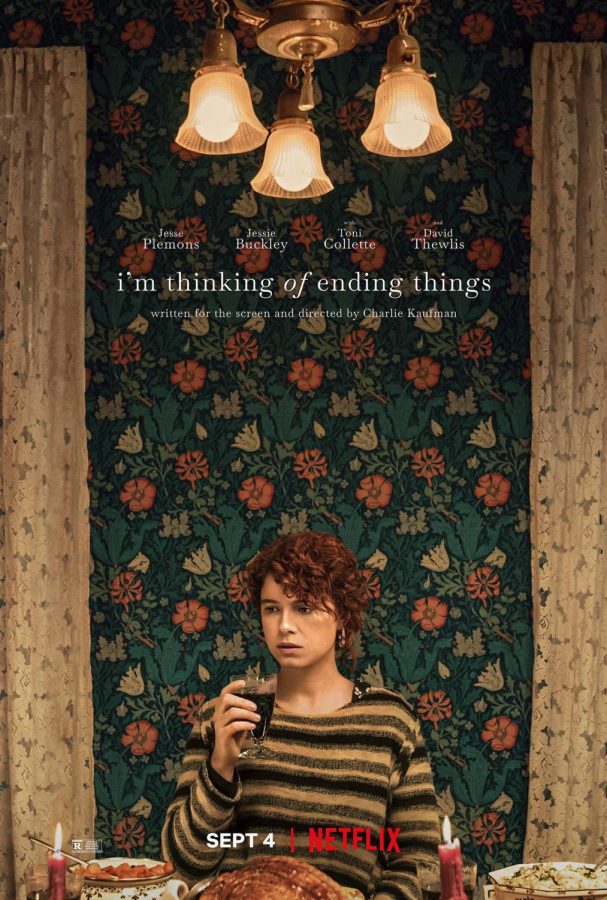Unproductive Criticism Film Review: I’m Thinking of Ending Things
Charlie Kaufman returns to film with a worthy addition to his repertoire.
The movie poster for Charlie Kaufman’s “I’m Thinking Of Ending Things,” courtesy of Netflix.
September 30, 2020
BEFORE YOU READ: Brief mentions of mental illness and suicide.
Through a painfully honest depiction of loneliness and lingering pain, I’m Thinking of Ending Things brilliantly portrays the self-destructiveness of depression. As an unmistakable allegory for suicide contemplation and the symptoms of mental illness, this film handles heavy themes that are too often avoided in social discussion. A raw depiction of sensitive topics is no simple feat, but director Charlie Kaufman successfully delivers a genuine tale of despondency without holding the hand of the audience. I’m Thinking of Ending Things can best be described only as an exhibition of screenwriting brilliance because a single, specific description would vastly vary from viewer to viewer.
Marking the end of Charlie Kaufman’s five-year hiatus in film making, the Netflix original is a must-see for any fan of interpretive psychological projective tests. I’m Thinking of Ending Things develops similar ideas to Kaufman’s early works such as Eternal Sunshine of the Spotless Mind and Anomalisa with its exploration of heartache and disconnection while utilizing the abstract storytelling methods of Synecdoche, New York. In this misanthropic story, Kaufman portrays the damaging effects of depressive thoughts through a seemingly innocuous idea. Once the seed of something like “I’m thinking of ending things” has been planted, the thought is destined to spread and grow into something truly harmful and malicious. Kaufman demonstrates this through an extended metaphor by comparing life to a decomposing relationship. What is particularly impactful about this choice in story-telling is that it allows the viewer to feel the suffocating sensation of depression by painting a canvas they can project onto and relate to. The metaphor is communicated through a dream-like stream of consciousness that lulls spectators into a false sense of security and leaves them just as vulnerable to the jarring and irrational emotional spikes of depression that is experienced by a person with mental illness.
Every aspect of the filmmaking works in tandem to elicit a sense of dread that encompasses the film’s entirety so that mental illness can be understood by those who have not experienced it. In the same way thoughts can grow more repetitive and detrimental with their increasing ever-presence, the film’s story devolves into something more sinister as characters fall prey to the predacious qualities of depressive thoughts. These are just a few of the many effective tactics Kaufman utilizes when evoking these inarticulable feelings and imparting his complex ideas relating to a longing for death.
Almost like a Rorshach inkblot, the narrative of I’m Thinking of Ending Things is defined by abstraction to the point where varying interpretations are concurrently just as valid and meaningful. What is constant, however, is the beautifully claustrophobic cinematography by Lukasz Zal, the artistic juxtaposition of melancholic tones and uplifting composition by Jay Wadley, the riveting performances by Jessie Buckley and Toni Collette, and (of course) the nuanced screenwriting by Charlie Kaufman. I’m Thinking of Ending Things stands out in the current onslaught of industry schlock that reflects Hollywood’s seemingly creative impotence by crafting a unique and personal adaptation of Iain Reid’s psychological thriller. Though the substantial topics discussed in the film are a turn-off for general audiences, a person with the right mindset for an elaborately painful think-piece will be touched by Kaufman’s brave themes and somber messages.






Herman • Oct 15, 2020 at 12:41 pm
100% agree with John. Jazzed to see young people these days using words like “Schlock”
John • Oct 1, 2020 at 6:25 am
Big fan of how you used the word “schlock”.